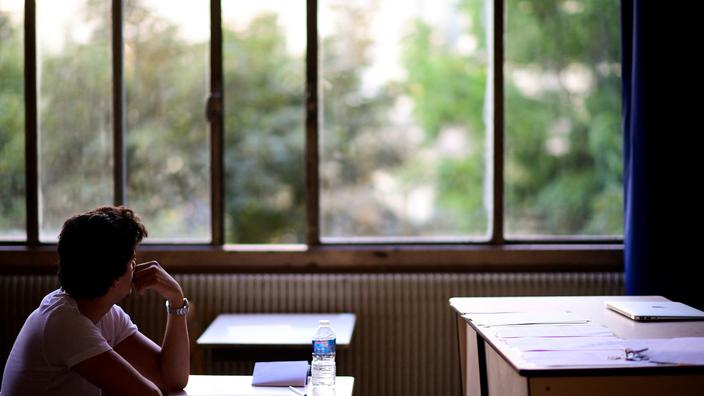Maroun Eddé is a normalien and specialist in political philosophy.
To discover
Michel Houellebecq: "A civilization which legalizes euthanasia loses all rights to respect"
Hell, they say, is paved with good intentions.
Our time has the gift of embodying this proverb more every day.
Latest measure: the decision of the prestigious École Normale Supérieure de Paris to grant additional points in the entrance examination for scholarship holders, or even to increase the results of those whose parents have a lower level of education.
A real poisoned gift, this decision risks breaking moral equality with other students and disadvantaging those she claims to help.
The competition, institution of excellence at the heart of meritocracy
The competitions were created during the 19th century with the aim of replacing privileges and nepotism at the entrance of the grandes écoles and the senior civil service. The competition is the end of favors: all candidates, whatever their name, gender or background, are subject to the same impartiality. Rewarding above all work and effort and constituting the last bastion of excellence in a system leveled by egalitarianism, the competitive examination system is still today a real opportunity for social advancement for the most deserving: we nearly 30% of scholarship holders in preparatory classes and 20% among those admitted to ENS each year. Even those who are not admitted end up integrating other excellent training courses. VS'France is to the credit of offering free education of such a level and allowing more than 20,000 students from disadvantaged backgrounds to enter each year the most prestigious grandes écoles in the country and have the same recognition as their peers.
Because in addition to attacking their dignity by questioning their intellectual equality with other candidates, they are made less legitimate in the event of success.
Maroun Edde
Delegitimization of scholarship holders
But this is no longer enough for our time. Instead of congratulating ourselves on the successes made possible by this system, we criticize it, accuse it, condemn it and pretend to change it to finally make it fairer. But the best is the enemy of the good. Because far from being of service to scholarship holders, granting them points in advance risks delegitimizing them. The scholarship holder, like any student in preparatory classes, wants to succeed through his work and his own efforts. He wants to deserve what he gets. Giving him extra points is to imply that he would not be good enough to be successful on his own. This is condescending to imply that he, unlike the privileged students, needs help to get the competition. His parents being less educated, he is necessarily less brilliant. This misplaced charity is toelsewhere rejected by the scholarship holders themselves, when we take the trouble to ask their opinion: a survey conducted in June by the National Office of Management School Students shows that 70% of scholarship holders questioned are against the idea.
Because in addition to attacking their dignity by questioning their intellectual equality with other candidates, they are made less legitimate in the event of success.
An admitted scholarship holder will never know whether he succeeded on his own or because the competition was rigged in his favor.
Doubt will remain, creating within the school a split between those who had the help by their own efforts and those who had it by getting help.
The famous impostor syndrome, already present among students on social advancement, will only emerge reinforced.
Focusing on scholarship holders of preparatory classes, who represent only 3% of scholarship holders in higher education, means wanting to help the few survivors of a system where most of the inequalities are played out elsewhere.
Maroun Edde
Help those who no longer need it
In addition to the perverse effects of such a measure, we have the wrong target. It is not in preparatory class that the social elevator breaks down, but at the university, which concentrates half a million scholarship holders in a few non-selective licenses with very high failure rates, sometimes of the order by 60%. It is not in the preparatory class either that the differences in level widen but well upstream, from early childhood, when learning to speak, read and write, then in elementary, middle and high school. Focusing on scholarship holders of preparatory classes, who represent only 3% of scholarship holders in higher education, means wanting to help the few survivors of a system where most of the inequalities are played out elsewhere. Getting to preparatory class isis to have already succeeded in overcoming all these trials, it is to have already had an exceptional journey and we can do the honor to the one who has reached this point to consider that he has the capacity to come out on his own for the after. Rather than focusing on those who no longer need help, a real policy of social justice would focus on those we lose successively throughout our education system. Real diversity cannot be decreed downstream, it is built upstream and over the long term. The grandes écoles, including the ENS, have long worked in this direction with training and guidance programs in middle and high schools. But they seem to have ended up giving up and made the choice of the easy way: superficially rigging the competitions ofentry to make up statistics that would have taken years of effort to be truly achieved.
And this is where the shoe pinches: far from a measure of social justice, it is above all a communication measure to improve the image of the school at a time when virtue is a matter of marketing.
Maroun Edde
Gain a good conscience at a lower cost
Behind such a measure is increased competition between grandes écoles to find out which one can display the most diversity. The challenge for the ENS is to improve its official statistics on social diversity to cope with Anglo-Saxon universities and business schools, each one outbidding affirmative action policies to give themselves a good image. inexpensively. And this is where the shoe pinches: far from a measure of social justice, it is above all a communication measure to improve the image of the school at a time when virtue is a matter of marketing. An era steeped in poorly understood egalitarianism,where righteous elites compete against each other with noxious measures to clear their conscience without worrying more about who will pay the price. In this case, the main beneficiary of this measure will be the ENS and its media image. And the main losers will be the scholarship holders, the very people we claim to be helping.








/cloudfront-eu-central-1.images.arcpublishing.com/prisa/O5ZJ6B4K3ZFJBLCDZV64N4CQ6Y.JPG)



/cloudfront-eu-central-1.images.arcpublishing.com/prisa/KMEYMJKESBAZBE4MRBAM4TGHIQ.jpg)


